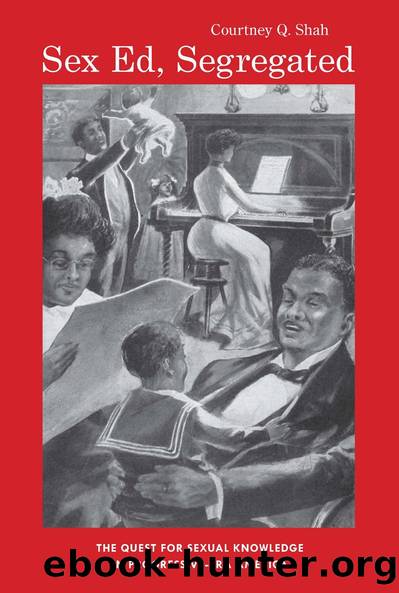Sex Ed, Segregated by Courtney Q. Shah

Author:Courtney Q. Shah [Shah, Courtney Q.]
Language: eng
Format: epub
Tags: History, United States, 20th Century
ISBN: 9781580465359
Google: JlSECgAAQBAJ
Publisher: Boydell & Brewer
Published: 2015-01-15T00:34:11+00:00
Chapter Five
Sex Education in the American Expeditionary Force
Dr. George Walker, a colonel in the Army Medical Corps, published a report in 1922 about venereal disease and sexuality during World War I. In it, Walker raised the specter of dangerous âFrenchâ influences on the more than four million men who had served their country during the war.1 Among these was the spread of what he called âsex abnormalities,â what we today would call oral sex. Walker feared that these new sexual activities gained popularity among the less-experienced or less-adventurous American doughboys, causing âa subtle state of demoralization that is far more dangerous to society as it is at present constructed ⦠than mere immorality could ever be.â2 It seemed many American soldiers during World War I received plenty of sex education. But what were they learning and from whom? World War I marked a high point in the history of sex education, as the military took an active role in teaching it for the increased health, efficiency, and morality of its soldiers.
At the turn of the twentieth century, Americans were feeling the concomitant pressures of two major social and ideological impulses: imperialism abroad and Progressivism at home. The two often contradicted one another in their beliefs and realities. Many Progressives feared that a large American empire might distract policy makers from problems at home or add new problems to an already overtaxed society.3 In 1900, after defeating the Spanish in Cuba and the Philippines during the Spanish-American War, the United States entered into a long occupation of the Philippine Islands, a new American protectorate. The imperialistic militarism exhibited by such actions aroused the anger of anti-imperialists at home. Muckraking exposés highlighted the contradictions inherent in American imperialism. Some factions of Progressives and anti-imperialists alike considered the Philippine incursion a violation of American ideals. They complained that American âcivilization,â through the influence of the American military presence, degraded rather than uplifted the native population.
The reaction stateside to action abroad signaled a substantial change in American attitudes toward military life, prostitution, and the role of the government in moral protection. The Chicago New Voice, a leading prohibitionist newspaper, sent a journalist to report on conditions in Manila in 1900. The Chicago reporter, William B. Johnson, wrote, âFar more of our boys who are lying there met their death through bad women and drink than through the bullets of the Filipinos. Five hundred American soldiers were recently exhumed from this field and sent to the States, mostly victims of drink and lust.â4 Follow-up articles chided the US military for instituting regulated prostitution abroad, a policy that already had failed at home.5 Henry B. Blackwell, coeditor of the Womanâs Journal, commented that Johnsonâs report âdiscloses the shameful fact that the State Regulation of Vice, which exists nowhere in this country, having been abolished years ago in St. Louis by an uprising of the good women and men of that city, has been introduced, and is being openly enforced by the army authorities in Manila.â6 To
Download
This site does not store any files on its server. We only index and link to content provided by other sites. Please contact the content providers to delete copyright contents if any and email us, we'll remove relevant links or contents immediately.
4 3 2 1: A Novel by Paul Auster(11050)
The handmaid's tale by Margaret Atwood(6853)
Giovanni's Room by James Baldwin(5878)
Big Magic: Creative Living Beyond Fear by Elizabeth Gilbert(4723)
Asking the Right Questions: A Guide to Critical Thinking by M. Neil Browne & Stuart M. Keeley(4576)
On Writing A Memoir of the Craft by Stephen King(4214)
Ego Is the Enemy by Ryan Holiday(3991)
Ken Follett - World without end by Ken Follett(3973)
The Body: A Guide for Occupants by Bill Bryson(3802)
Bluets by Maggie Nelson(3711)
Adulting by Kelly Williams Brown(3671)
Guilty Pleasures by Laurell K Hamilton(3587)
Eat That Frog! by Brian Tracy(3514)
White Noise - A Novel by Don DeLillo(3436)
The Poetry of Pablo Neruda by Pablo Neruda(3367)
Alive: The Story of the Andes Survivors by Piers Paul Read(3311)
The Bookshop by Penelope Fitzgerald(3228)
The Book of Joy by Dalai Lama(3218)
Fingerprints of the Gods by Graham Hancock(3213)
